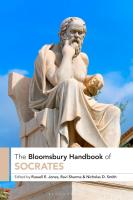
Bloomsbury (2nd edn., 2024) h/b 424pp £130 (ISBN 9781350185678)
This book, which provide a comprehensive guide to the main issues in the philosophy of Socrates, focuses on the shorter dialogues of Plato, but also has regard to other ancient writers. Some new chapters have been added since the first edition, other chapters have been revised. No review of modest length such as this can do justice to all the fifteen chapters, which cover comedy, teaching, methods, forms, ignorance, definition, intellectualism, eudaimonism, love, emotions, political philosophy, theology and piety, death and afterlife, and the trial.
The book opens with a new chapter by Alessandro Stavru, ‘Socrates in old comedy’. As is well known, Socrates features in three surviving plays by Aristophanes: Clouds (originally staged in 423, revised 420-417), Birds (414) and Frogs (405). Less well-known is that other comic playwrights, whose works have been largely lost, also portrayed Socrates. Fragments of the works of Ameipsias, Eupolis, Telecleides and Callias reveal that they all represented him in a broadly similar way to Aristophanes.
What is significant about the comic playwrights is that, unlike Plato and Xenophon, they were writing about Socrates during his lifetime. To be the butt of comedians’ humour is in many ways a compliment (Denis Healey, UK Chancellor of the Exchequer in the 1970s, took delight in being parodied on television by the comedian Mike Yarwood). Itis clear that Socrates was a notable personality throughout the last thirty years of the fifth century BC.
Socrates’ fame came in part from his valour during two military campaigns, in 432 and 424, but primarily from his work as a public teacher. They represent his teaching as revolving around four themes: (a) the study of nature, (b) non-official religiosity and scepticism about traditional religion, (c) fraudulent lyrical and rhetorical skills, and (d) ascetism and poverty. Stavru argues that these four themes are interconnected and form a coherent course of study. This can best be seen in Aristophanes’ Clouds.
Much of the book grapples with the ‘Socratic problem’. That is whether, and if so how, the views of the historic Socrates can be recovered from the representations of him in ancient literature. Most contributors focus on the accounts given by Plato. However, Jones and Sharma argue that Xenophon’s Memorabilia and Apology (a version of Socrates’ defence speech at his trial) are also valuable resources. This proposition runs into the difficulty posed by seemingly stark inconsistencies between those works and the picture presented by Plato. In Xenophon, Socrates claims to possess wisdom and virtue. In Plato, Socrates readily and repeatedly disclaims knowledge and thereby virtue. Jones and Sharma put forward a resolution, namely that Xenophon, if properly interpreted, portrays Socrates as seeking knowledge and virtue, but not actually achieving it. Readers will form their own views about this suggested reconciliation.
Plato’s early dialogues are the most reliable evidence of Socrates’ views and teaching. These are Apology, Charmides, Crito, Euthydemus, Euthyphro, Gorgias, Hippias Major, Hippias Minor, Ion, Laches, Lysis, and Protagoras. In these dialogues (other than Apology) Socrates probes the essence of concepts and things. What is piety? What is temperance? What is courage? What is a friend? And so forth. In a well-reasoned chapter William Pryor demonstrates that Socrates was articulating an early version of Plato’s theory of forms (when this reviewer was at university, people called it his theory of ideas.)
In a chapter on Socratic virtue intellectualism, Justin Clark explores some greatest puzzles in Socratic scholarship. For example, did Socrates really think that people always do what they believe to be best, with the logical consequence that all wrongdoing is the result of ignorance? Did Socrates see virtues as separate? Or did he regard them all as parts of a single whole? This is a question on which scholars are lined up on both sides. Clark concludes that there are serious problems with both interpretations.
This book is, as the title suggests, a handbook. It is not designed for the casual reader: it assumes a basic understanding of Greek philosophy. It is, however, a treasure trove for anyone making a serious study of Socrates' life and teaching.
Rupert Jackson
